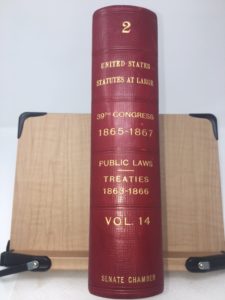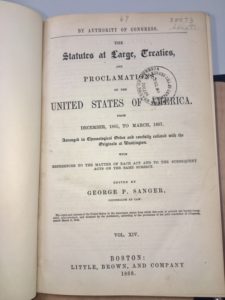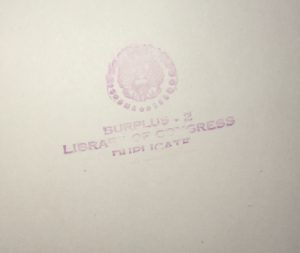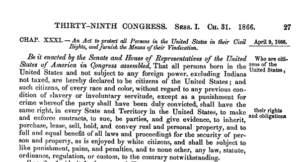“An Act to protect all Persons in the United States in their Civil Rights, and furnish the Means of their Vindication”
[39th Congress, Session 1, Chapter 31; 14 Stat. 27-30]
Section 1 established equal rights for former slaves and provided that:
• “all persons born in the United States are declared to be citizens of the United States”;
• and such citizens, of every race and color, without regard to any previous condition of slavery or involuntary servitude shall have the:
“same right, in every State and Territory in the United States, to make and enforce contracts, to sue, be parties, and give evidence, to inherit, purchase, lease, sell, hold, and convey real and personal property, and to full and equal benefit of all laws and proceedings for the security of person and property, as is enjoyed by white citizens, and shall be subject to like punishment, pains, and penalties, and to none other, any law, statute, ordinance, regulation, or custom, to the contrary notwithstanding.”
Sections 2 – 8 contain the Act’s enforcement mechanism, including criminal punishment and fines for interference with the new rights for former slaves, with enforcement in federal courts:
And be it further enacted, That any person who, under color of any law, statute, ordinance, regulation, or custom, shall subject, or cause to be subjected, any inhabitant of any State or Territory to the deprivation of any right secured or protected by this act, or to different punishment, pains, or penalties on account of such person having at any time been held in a condition of slavery or involuntary servitude, except as a punishment for crime whereof the party shall have been duly convicted, or by reason of his color or race, than is prescribed for the punishment of white persons, shall be deemed guilty of a misdemeanor, and, on conviction, shall be punished by fine not exceeding one thousand dollars, or imprisonment not exceeding one year, or both, in the discretion of the court.
Section 9 enabled the President to deploy the military as necessary to enforce the Act:
And be it further enacted, That it shall be lawful for the President of the United States, or such person as he may empower for that purpose, to employ such part of the land or naval forces of the United States, or of the militia, as shall be necessary to prevent the violation and enforce the due execution of this act.
Section 10 provided for final appeal to the Supreme Court:
Sec. 10. And be it further enacted, That upon all questions of law arising in any cause under the provisions of this act a final appeal may be taken to the Supreme Court of the United State
Background: President Johnson vetoed the Act stating that former slaves were not qualified for United States citizenship and that the bill would “operate in favor of the colored and against the white race.” Radical Republicans overrode the presidential veto two weeks later on April 9, 1866 by a vote of 122 to 41. Significantly, this was the first time Congress overrode a presidential veto of major legislation. (The first ever veto override occurred in 1845 when the 28th Congress overrode lame-duck President John Tyler’s veto of an appropriation bill)
Radical Republicans believed that the Act was the next logical step after the 13th Amendment abolished slavery in December of 1865. According to Representative Henry Raymond the Act was “one of the most important bills ever presented to this House for its action.”
Yet, President Johnson disagreed with the extraordinary use of federal power to intervene to enforce the Act, describing the legislation in his veto message as “another step, or rather a stride, toward centralization and the concentration of all legislative power in the national Government.” As a former Southern Democrat, President Johnson refused to enforce this law. For further reading about the 14th Amendment and President Johnson click here.
Because many in Congress questioned the Act’s constitutionality the 14th Amendment was adopted in 1868. After the adoption of the 14th Amendment, Congress reenacted the Act in 1871.
While the Civil Rights Act of 1866 was well intentioned, it illustrates that a law is merely a piece of paper without the will to enforce it.




